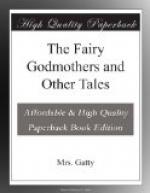the scene outside was, she seldom lifted up her eyes
to look at it. She had been all her life a great
admirer of beautiful scenes, and of all the varieties
the changes of day and night produce—but
now the sight of any thing particularly lovely brought
so painfully before her mind the fact that her child’s
eyes were closed to all these things, that she often
forbore to look again, and so spared herself a repetition
of the pang. Madeline’s eyes therefore
remained upon her work, or on her knee when she ceased
working,—for ever and anon there was a burst
of noise and merriment about the old house, which
startled her from her painful thoughts. It was,
however, the happy voices of her children, and again
and again she sank into her melancholy mood, and so
continued till the red hue of a very red sunset burst
as it were suddenly into the room, and lighted up
the portrait of Roderick, which hung over the mantel-piece.
Involuntarily Madeline’s eyes glanced from the
lovely countenance of her then bright-eyed boy, thus
illuminated, to the sun beyond the Sea. She was
too late, however. He had just descended behind
the waves in a perfect flood of crimson glory, but
as she gazed, (for she could not withdraw-her eyes,)
a haze—yes, the softest and most etherial
cloud-like haze, showing the outline of a beautiful
mountainous island, rose in the far off distance, just
on the verge of the horizon. It was the Fairy
Island. It recalled to the mother’s remembrance
the existence of her Fairy cousin once more. “Cruel,
cruel Eudora,” she exclaimed, “you offered
me friendship and assistance, and in the hour of trouble
and affliction you have never been near to help or
even to comfort me.”
And Madeline, in the bitterness of her heart, closed
the window hastily and angrily, and sat down.
Soon, however, the noises she had several times heard
of the children playing, became louder and louder,
and the whole party burst at last into the room.
“Mamma, Mamma,” they cried, scarcely able
to speak, “guess where Roderick has been.”
“I cannot.” “Oh, but do, dear
Mamma!” cried a little thing with fairy curls,
“do guess.” “I cannot.”
“I’ll tell Mamma,” cried a stout
sturdy fellow, a little older; “Mamma! he’s
been up the winding staircase of one turret, and all
along the leads and down the winding staircase of
the other turret, and he has done it three times, and
he has seen to do it better than I can.”
Here there was a burst of laughter and a violent clapping
of hands at the little fellow’s Irish
account.
“But why don’t you do it as well?”
asked an elder girl, “you that are going to
be a soldier too!”
“Yes; I know I’m going to be a soldier;
and I’ll try and do it as well as Roderick;”
and off ran the eager child, followed by the rest of
the party, all but Roderick. He lingered behind,
and edging his way easily and quietly as usual to
his Mother, having asked her where she was, he sat
down on a footstool at her feet. The slight answer
she had occasion to make, revealed by its tone, to
the now acute blind child, that his Mother’s
mood was serious, and therefore he did not talk and
laugh of what he had accomplished, as he otherwise
might have done. There was a silence of some
minutes: at last, “Mamma,” said Roderick
gravely, “a light has broken in upon me to-day.”




